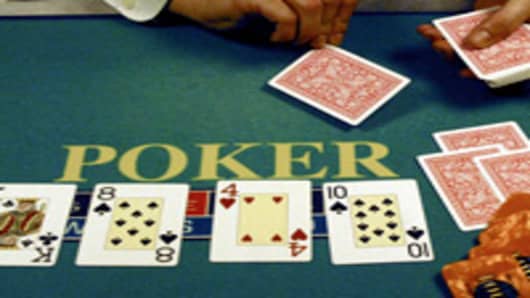The World Series of Poker has turned into a tremendous property for ESPN over the years. It’s basically the sporting world’s version of the lottery, with a little bit more skill attached.
The plot works something like this. Guy you never heard of wins millions of dollars. He then quits his job to become a professional poker player.
All great stories.
Chris Moneymaker wins $2.5 million in the 2003 event after having his entry fee paid for by winning a $39 online tournament.
The following year, Greg Raymer, a fossil collector with strange holographic sunglasses, takes home $5 million and quits his job as a patent lawyer.
Producer and talent agent Jamie Gold wins what might go down as largest prize ever when he wins the $12 million prize in 2006. He eventually had to give some of that up after settling a lawsuit with a man who claimed Gold made an agreement prior to the event to split the prize.
If the World Series of Poker or ESPN has any issue, it has been that the Cinderella story is getting old. But luckily, this year, all the cards will be in their favor.
The final table shaped up last night. It includes nine players, many of whom have good stories to tell. There’s Steven Bagleiter, a former head of corporate strategy for Bear Stearns and a self-employed logger from Oakland, Md.
But it also includes Phil Ivey, a poker pro who has won seven World Series of Poker bracelets and a World Poker Tour title. I have to be honest. Ever since the World Series of Poker really exploded five years ago, I never thought a so-called star would ever make it to the final table. With thousands of people entering, all of whom were getting plenty of practice due to the growth of the game online (not to mention the simple element of luck), it would be easy to assume that every champion would fall off the face of the earth.
Ivey, who is in eighth place out of the nine players, is really the first name to make it to a final table in recent years that has serious marketability. And it plays perfectly into ESPN’s hands since they smartly decided to delay the final table for four months to allow for a quick turnaround of the winning broadcast so the champ isn’t known for months. Doing this for the first time last year resulted in a huge increase in ratings for the final table.
Having Ivey there will allow the audience to see just how good these guys are. Here’s a guy who has won $10.8 million playing poker. If Ivey can stick around for a while, it could be the most compelling television in poker history.
Questions? Comments? SportsBiz@cnbc.com



